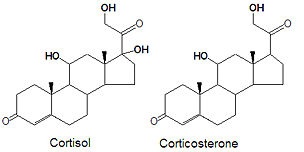Answer: Cortisol and corticosterone are both glucocorticoid hormones involved in the stress response, but cortisol is mostly used by humans while corticosterone is mostly used by other animals.
Stress is a natural, protective response that is beneficial to an organism. The body under stress experiences a variety of physiological changes, including an increase in heart rate and blood pressure, an increase in respiration, and a decrease in digestive activity, for example. An organism in the wild may experience stress when they are being attacked by a predator. This acute stress response is sometimes called the “fight or flight” response.
Part of the way the body responds to stress is controlled by the action of substances called glucocorticoids. These substances are hormones, which are produced and circulate throughout the blood. They can travel anywhere the blood goes, and they act to signal organs far away from the site of production. There are some similarities and differences between cortisol and corticosterone.
Chemical structures of cortisol and corticosterone
Similarities
Both cortisol and corticosterone are large hormone compounds. They are both 21 carbon compounds.
Also, they are both synthesized from the precursor molecule cholesterol, a 27 carbon substance that is synthesized by the liver. Through a series of enzymatic reactions, the structure of cholesterol is modified. Eventually, two precursor molecules may be created. The enzyme 11 beta hydroxylase performs the final synthetic step, which results in the creation of either corticosterone or cortisol.
Differences
The difference chemically speaking is that cortisol has an extra hydroxyl group on the 17th carbon, whereas corticosterone does not. As different structures, they have different IUPAC names. Cortisol is 11β,17α,21-trihydroxypregn-4-ene-3,20-dione, while corticosterone is 11β,21-dihydroxypregn-4-ene-3,20-dione.
Organisms that use it
Similarities
Both cortisol and corticosterone are found and used by both humans and nonhumans.
Differences
Cortisol is primary stress hormone by humans and many large animals, but corticosterone is the main glucocorticoid in rats, mice, birds, and reptiles.
Corticosterone in humans serves a role as a chemical precursor more than a signaling molecule. For example, corticosterone is converted into the mineralocorticoid aldosterone, which contributes to our body's ability to regulate sodium and potassium levels.
